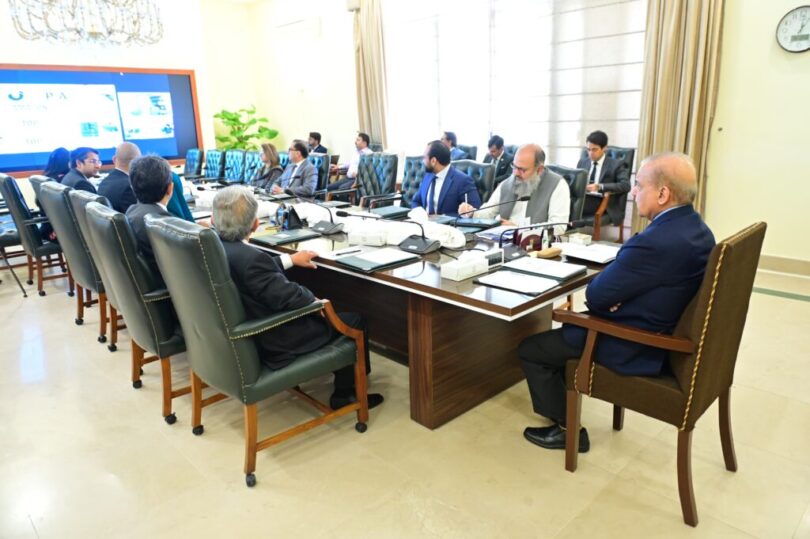Prime Minister Muhammad Shehbaz Sharif has directed the authorities to formulate a strategy aimed at a two-fold increase in the country’s exports within the next five years. The Premier tasked the Ministry of Trade to compile a comprehensive mechanism in consultation with successful entrepreneurs and stakeholders that not only facilitates exporters in the e-commerce sector but also resolves the issues of Made in Pakistan brands. The government in consultation with relevant businesses was taking steps for maximum utilization of the export sector, with a specific focus on the promotion of IT, domestic use items, textiles, and other exceptional sectors. According to the Prime Minister, Foreign Direct Investment (FDI) was the top priority of the government transforming challenges into opportunities and building the economy out of scratches.
Export-oriented industrialization (EOI) or Export-Led Growth, is a trade and economic policy that aims to accelerate a country’s industrialization process by focusing on exporting goods for which the nation has a comparative advantage. The EOI capitalizes on a country’s strengths in specific industries by identifying areas where the nation excels, it strategically promotes the production and export of specific goods. It involves opening domestic markets to foreign competition which increases the country’s access to international markets. Tariff barriers are reduced, and policies are designed to facilitate exports. At the same time, governments support export-oriented sectors through subsidies, infrastructure development, and favorable policies to encourage growth in those areas. Export-led growth allows countries to earn hard currency through exports, which can then be used to import foreign goods affordably from abroad.
Pakistan’s economy grapples with persistent trade imbalances, with imports several times greater than exports, scanty foreign reserves, and a lack of foreign investment together with the strong competition at the global level which largely shrunk the volume of the Pakistani exported goods in the global marketplace. Realistically, Pakistan, with its rich tapestry of resources and industries, stands at a pivotal juncture where the need for an export boom is more important than just traditional cartels-driven and politically influenced economic strategies. Currently, an export boom becomes imperative to recalibrate the country’s economy, fostering a trade surplus that contributes to a more stable balance of payments. By leveraging an export portal for economic growth, Pakistan can strategically position itself to increase export volumes, bridging the trade gap and consolidating its economic foundations. The expansion of export-oriented industries, supported by a dedicated export portal for economic growth, translates into increased demand for skilled and unskilled labor. The job creation not only curbs poverty and alleviates unemployment but also injects vigor into the local economy, fostering a cycle of economic growth. In fact, growth, competitiveness, and an export boom are interdependent and directly connected. Continuous innovation, improvement in efficiency, cost-effectiveness, and adherence to international quality standards are important to thrive in the global marketplace An export portal for economic growth becomes a catalyst for enhancing competitiveness by providing a platform where businesses can benchmark their products and services against global standards, ensuring they meet the expectations of discerning international consumers.
Historically, the Pakistani industry particularly the export sector faces serious issues relating to high energy tariffs, long power outages, competing quality standards, and acceptance in the global market. Meanwhile, energy generation and export boom are the recipes to resolve the long-held economic volatility of the South Asian nation. Hence, a robust export sector has the potential to alleviate the burden of foreign debt on Pakistan’s economy. Increased export earnings, facilitated by an export portal for economic growth, generate additional revenue to facilitate debt servicing. Such approaches not only reduce reliance on external financing but also strengthen the Country’s financial standing on the global stage. The Special Investment Facilitation Council (SIFC) has played an adorable role in attracting foreign investment from friendly nations and forging a conducive environment for businesses and industries, yet there is a need for more procedural liberation and functional monitoring of the economy, to reduce bureaucratic red-tapism and promote transparency in economic affairs. At the time, only an export-oriented and sustainable economy is the linchpin in resolving Pakistan’s unceasing economic woes and unlocking prosperity and affluence in the crisis-hit nation. As soon as this stratagem is realized on the ground, the nation will start translating into its long-held economic version of the Asian Tiger in the days to come.







